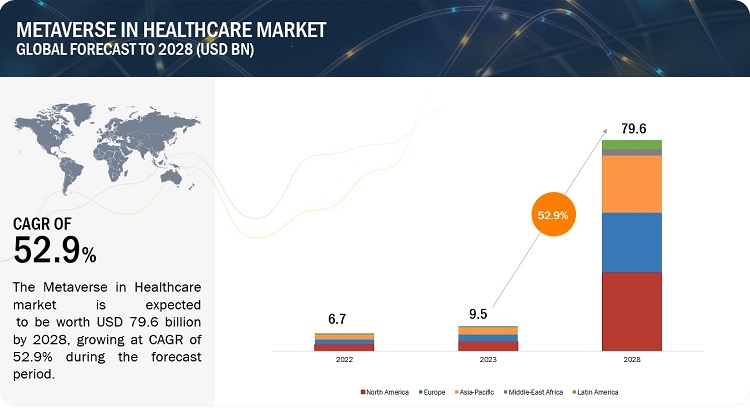Metaverse in Healthcare Market worth $79.6 billion by 2028
Metaverse in Healthcare Market in terms of revenue was estimated to be worth $9.5 billion in 2023 and is poised to reach $79.6 billion by 2028, growing at a CAGR of 52.9% from 2023 to 2028 according to a new report by MarketsandMarkets™. The increasing adoption of mixed reality for performing minimally invasive surgeries, growing focus on telemedicine, increasing use of digital twins, and the growing importance of blockchain technology in healthcare are the key factors driving the growth of this market. However, increasing concerns over data privacy and security and the high implementation cost of technologies are expected to restrain the growth of this market.

Download PDF Brochure:
https://www.marketsandmarkets.com/pdfdownloadNew.asp?id=225839181
Browse in-depth TOC on "Metaverse in Healthcare Industry"
121 - Tables
39 - Figures
237 – Pages
North America accounted for the largest share of the metaverse In healthcare industry during the forecast period.
In 2022, North America accounted for the largest share of the market, followed by Europe, Asia Pacific, Middle East & Africa and Latin America. The adoption of metaverse solutions for healthcare applications is expected to be the highest in North America (compared to other regions). North America is the leading market in terms of developing cutting-edge technologies used in display devices.
Metaverse in Healthcare Industry Dynamics:
Drivers:
- Increasing adoption of mixed reality for performing minimally invasive surgeries
- Applications of metaverse in telemedicine
- Increasing use of digital twins
- Increasing importance of blockchain technology in healthcare
Restraints:
- Data privacy and security concerns
- High implementation cost
- Health and mental issues from excessive use
Opportunities:
- Increasing use of metaverse in medical education and training
- Use of metaverse in surgical applications
Challenges:
- HIPAA regulations for healthcare metaverse
- Interoperability issues
- Local government restrictions coupled with environmental impact
Key Market Players:
Microsoft (US), NVIDIA Corporation (US), XRHealth (US), CAE Inc. (Canada), Koninklijke Philips N.V. (Netherlands), ImmersiveTouch, Inc. (US), Wipro (India), Siemens Healthineers AG (Germany), Medtronic plc (Ireland), GE HealthCare (US), Intuitive Surgical (US), 8Chili, Inc. (US), MindMaze (Switzerland), AccuVein, Inc. (US), EON Reality (US), Brainlab AG (Germany), Novarad Corporation (US), Oodles Technologies (India), CMR Surgical (UK), Merative (US), BioflightVR (US), WorldViz, Inc. (US), Google (US), Oculus (Meta Platforms, Inc.) (US), and Augmedics (US) are the major players in this market. These companies are majorly focusing on the strategies such as acquisitions, product launches, agreements, collaborations, partnerships, and expansions in order to remain competitive and further increase their share in the market.
Request 10% Customization:
https://www.marketsandmarkets.com/requestCustomizationNew.asp?id=225839181
Recent Developments:
- In March 2023 NVIDIA Corporation (US) partnered with Microsoft (US) , This collaboration will help connect Microsoft 365 applications and NVIDIA Omniverse to digitalize their operations, engage in the industrial metaverse, and train advanced models for generative AI and other applications
- In February 2023, Wipro (India) launched Decentralized Identity and Credential Exchange (DICE) ID, which enables the insurance and verification of tamper-proof, self-verifiable digital credentials for current or potential healthcare or financial service providers, as well as educational institutions.
- In November 2022, GE Healthcare (US) collaborated with MediviewXR(US) . This collaboration was aimed at developing the OmnifyXR medical imaging system.
Metaverse in Healthcare Market Advantages:
- Enhanced Access to Healthcare Services: The metaverse allows for virtual consultations, enabling patients to access healthcare services remotely. This eliminates geographical barriers and increases accessibility, particularly for individuals in rural or underserved areas. Patients can receive timely medical advice, diagnoses, and treatment recommendations without the need for physical travel.
- Immersive Training and Education: Healthcare professionals can utilize the metaverse for immersive training experiences. Virtual reality simulations can replicate real-world medical scenarios, enabling practitioners to practice complex procedures, improve their skills, and enhance patient safety. Medical students can also benefit from interactive educational modules and virtual anatomy lessons, fostering a more engaging and effective learning experience.
- Collaborative Research and Data Sharing: The metaverse provides a platform for healthcare professionals and researchers to collaborate and share data seamlessly. This facilitates the exchange of knowledge, promotes interdisciplinary collaboration, and accelerates the pace of medical research. The ability to access and analyze large datasets in a virtual environment can lead to new insights, discoveries, and advancements in healthcare.
- Improved Patient Engagement and Empowerment: The metaverse offers interactive tools and experiences that can enhance patient engagement and empowerment. Patients can actively participate in their own healthcare by accessing personalized health information, tracking their health metrics, and engaging in virtual support communities. This increased involvement can lead to better health outcomes and patient satisfaction.
- Cost and Resource Efficiency: Virtual healthcare services provided through the metaverse can contribute to cost and resource efficiency in the healthcare industry. Remote consultations and monitoring can reduce the need for in-person visits, leading to cost savings for both patients and healthcare providers. Additionally, virtual training and educational programs can optimize resource allocation by minimizing the need for physical equipment and facilities.
- Expanded Reach and Global Collaboration: The metaverse transcends physical boundaries, allowing healthcare professionals and organizations from different parts of the world to collaborate and share expertise. This global collaboration can lead to the exchange of best practices, cross-cultural insights, and innovative solutions, ultimately benefiting patients on a global scale.
- The integration of the metaverse in the healthcare market brings forth numerous advantages, including enhanced accessibility, immersive training experiences, collaborative research opportunities, improved patient engagement, cost efficiency, and expanded global reach. These advantages have the potential to transform healthcare delivery, education, and research, ultimately improving patient outcomes and the overall quality of care.
Related Links:

Comments
Post a Comment